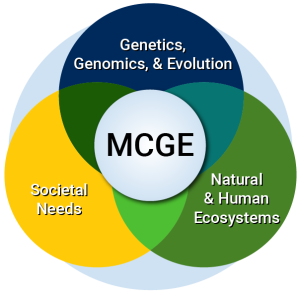Director’s Welcome

Welcome to the website of the Maine Center for Genetics and the Environment, or MCGE as we often call it. The Maine Center for Genetics in the Environment (MCGE) was formed in 2019 as a sustainability element of the NSF EPSCoR RII Track-1 Maine-eDNA Program (NSF #OIA-1849227). The center was founded around a vision to make Maine a national leader in transformative environmental genetic research, innovation, outreach, and training for the sustainability and wellbeing of natural and human ecosystems and the people that depend on them. I like to say that environmental genetics is a scientific bridge linking the natural resources, agricultural, and environmental systems on which our society depends on the biotechnology and information systems of our future.
We define “environmental genetics” very broadly to include all applications of genetics, genomics, and evolutionary methods to environmental challenges, natural resources, and sustainable systems. That’s a very large umbrella of topics. Indeed, current MCGE members study everything from the genomics of organismal responses to climate change, to landscape genomics, environmental DNA (eDNA) for threatened and invasive species, the role of evolution in sustainable fisheries, the dynamics of wildlife diseases, remote sensing of biodiversity, wildlife microbiomes, early detection of harmful algal and cyanobacterial blooms, groundwater and wastewater safety, and the spread of disease vector organisms like mosquitoes and ticks. And that is just a sampling of a much larger and ever-evolving list of topics.

MCGE researchers come from diverse backgrounds in freshwater, marine and terrestrial biology and ecology, evolutionary biology, fisheries and wildlife science, animal health, plant science and agriculture, engineering, bioinformatics, data science, communication science and anthropology, and of course genetics and genomics. And while the University of Maine is MCGE’s home institution, we seek to facilitate environmental genetics collaboration, training, and outreach throughout Maine and beyond. The center includes associate members from higher ed and research institutions throughout the state.
Importantly, we do not define our mission around fundamental or applied research per se, but around responsible and inclusive impacts. Our goal is to leverage environmental genetics to benefit people from all walks of life, communities, and industries, including those that have historically lacked access to genetics, genomics, and evolutionary resources, or even been disadvantaged by their misapplications. We are Maine’s environmental genetics resource, and we welcome opportunities to collaborate, advise, or train others. If you, your community group, your business, or your school have questions about environmental genetics, or think environmental genetics might provide a solution, please reach out to us at mcge@maine.edu.
Again, Welcome to MCGE!
Dr. Michael Kinnison
MCGE Director and Professor of Evolutionary Applications
